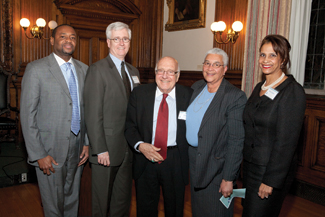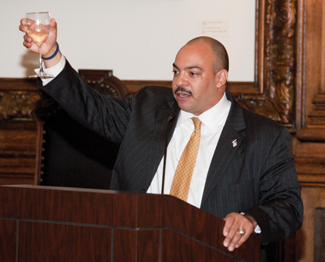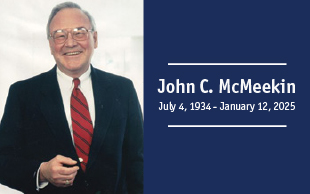
Last year, PHMC affiliate Joseph J. Peters Institute celebrated 55 trailblazing years of protecting children against the devastating results of sexual abuse. At Protecting Children 2010, its event held in December, JJPI highlighted organizational accomplishments and the dedicated work of outgoing board chair Paul J. Fink, MD. Protecting children is at the core of everything JJPI does.
As one of the nation’s first programs dedicated to the treatment of sexual abuse, JJPI is recognized as a national pioneer in the behavioral health field. Through the years, JJPI has played an important role in transforming the lives of children and families, as demonstrated by numerous outcome studies showing symptom reduction in survivors and low recidivism rates for offenders.
JJPI’s pioneering work has earned numerous awards including a GlaxoSmithKline International Impact Award in March 2002 for leadership, dedication to quality care, commitment to serving people in need, impact on the local community and capacity for meeting the needs of the underserved.
In 2000, Paul J. Fink began his ten-year role as an exemplary JJPI board chair. During his tenure, JJPI more than doubled its annual operating budget and total number of clients served. At Protecting Children 2010, John P. Delaney, Jr., a deputy district attorney in Philadelphia and guest speaker at the event, remarked on Fink’s passion for the JJPI mission and his ability to pound down decision-makers’ doors to make change happen. “While most people’s mission is to bring comfort to the afflicted, Paul’s mission is to bring affliction to the comfortable,” said Delaney. Translation: Fink shakes up the status quo to enact real change.
The goal is to reduce the incidence of childhood and other sexual abuse, which requires a multifaceted approach."
During the years Fink served as board chair, JJPI began working with the Philadelphia Department of Human Services and the School District of Philadelphia to screen children in kindergarten through fourth grade who demonstrate inappropriate sexual behavior in school. In September 2005, JJPI released its first child sexual abuse prevention program publication, entitled “Healthy Child Sexual Development: Recognizing Appropriate, Inappropriate, and Problematic Behavior in Children.” A cornerstone of JJPI is its Prevention Services program, which grew out of a national campaign that combined community outreach and education to encourage adults to take action before a child is harmed.
JJPI created Prevention Services in 2006 to provide a multidimensional curriculum of programs focused on prevention and intervention across a broad spectrum of ages, developmental levels, populations and self-interests. Prevention Services educates adults on how to recognize sexual behavior directed toward children and how to stop it from occurring.
Recently, JJPI and director of prevention services, Michael A. Stinson collaborated with colleagues from PHMC’s substance abuse treatment affiliate Interim House, Inc. and programs Interim House West and CHANCES. They developed on-site, moderated, parent roundtable discussions to educate and coach residential and outpatient clients in recovery about child sexual abuse prevention. These discussions have created an open forum for exploring the issues surrounding child sexual development and abuse. By providing this information to children, through their parents and caregivers, JJPI also establishes a solid foundation for children to begin making appropriate and healthy choices about their own behavior.
Stinson says, “Addiction recovery is a process that presents many challenges. Providing support and resources that help parents successfully deal with this issue of healthy child sexual development and safety is an investment that has the potential to pay huge dividends both now and in the future.” Through outreach and education, JJPI’s Prevention Services program can help to protect the overall health and well-being of children in the community.
According to Theodore Glackman, executive director of JJPI, the key to childhood sexual abuse prevention and treatment is approaching the issue in a “broad and deep way by dealing with a wide spectrum of problems, across a wide range of ages from children to adults.” Research shows that we most effectively protect the community by addressing the psychological trauma of both survivors and offenders and by raising awareness and understanding of the issue through prevention education. “Sexual abuse and sexual misbehavior are not uncommon,” says Glackman. “This is an aspect of our society that we need to recognize and respond to in ways other than just treating the survivor and punishing the offender.”
JJPI’s holistic approach has garnered attention locally, regionally and nationally and positioned the organization among the foremost thought-leaders in the field.
Biannually, JJPI hosts behavioral health experts from across the country to speak on new and established treatment approaches.
Most recently, Esther Deblinger, PhD, a nationally recognized licensed clinical psychologist and professor at the University of Medicine and Dentistry of New Jersey, facilitated a JJPI clinical services workshop. Deblinger is one of the originators of the Trauma-Focused Cognitive Behavioral Therapy model that JJPI has adopted as its standard of care for its work with child survivors of sexual abuse. JJPI regularly works with the Philadelphia Court of Common Pleas to provide evaluations, education and trial considerations in the sentencing and parole processes. JJPI’s experts also participate in Philadelphia Department of Human Services (DHS) multidisciplinary review teams to make recommendations for especially difficult DHS cases.
JJPI has made an indelible impact on the lives of children and families in the region in the last 55 years. With much left to do, JJPI is preparing for the next half century of protecting children. The organization is updating its training materials to help parents and therapists talk to children about sexual abuse, and it continues to increase its level of involvement with the court system. “Most childhood sexual abuse is preventable,” says Glackman. “The goal is to reduce the incidence of childhood and other sexual abuse, which requires a multifaceted approach and deep, comprehensive understanding of issues. Both aspects are evident in the programs and activities of JJPI.”
To learn more about JJPI, visit jjp.org.
Protecting Children 2010

On December 2, 2010, Joseph J. Peters Institute hosted Protecting Children 2010 to celebrate its 55-year history of positively affecting thousands of children and their families in the region. This year’s event also honored retired JJPI board chair Paul J. Fink, MD, one of the region’s leading advocates for children and victims of violence. Guests mingled at the historic College of Physicians of Philadelphia and were welcomed by JJPI Executive Director Theodore Glackman and board chair The Honorable Renée Cardwell Hughes. Later in the evening, local and national luminaries spoke on the accomplishments of JJPI and Fink. The evening’s guests included John Delaney, Philadelphia deputy district attorney; Seth Williams, Philadelphia district attorney; Arthur Evans Jr., PhD, director of the Philadelphia Department of Behavioral Health; and Estelle Richman, chief operating officer of the US Department of Housing and Urban Development.


Pictured left to right: Arthur C. Evans Jr., PhD, commissioner, Philadelphia Department of Behavioral Health and Intellectual disAbility Services; John Delaney Jr., assistant district attorney, City of Philadelphia; Paul Fink, MD; Estelle Richman, chief operating officer, US Department of Housing and Urban Development; and the Honorable Renée Cardwell Hughes (photo at beginning of article). PHMC vice presidents Michael Bedrosian and Bill Weber with PHMC senior vice president John G. Loeb, MSS (top photo). R. Seth Williams, district attorney, City of Philadelphia (bottom photo).





